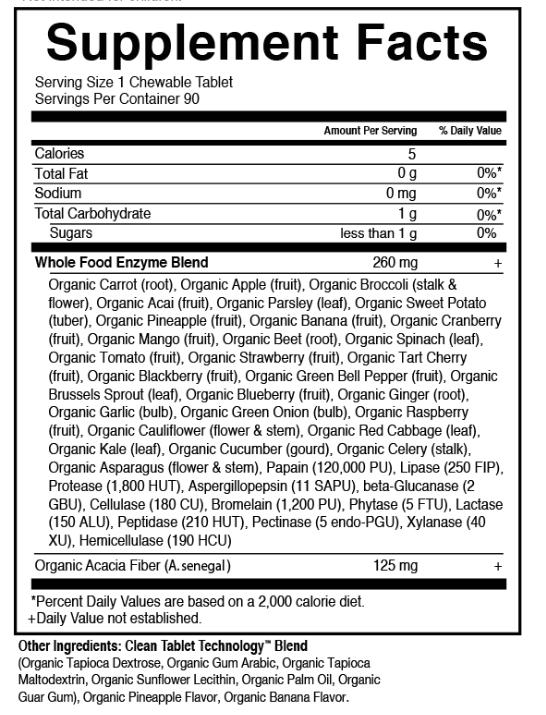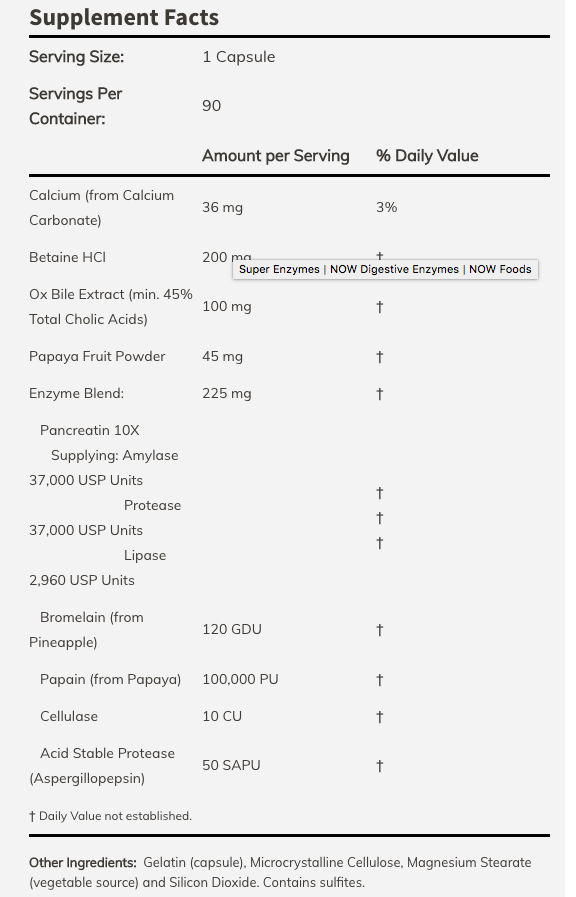Remember when probiotics were all the rage in the health and wellness word?
Digestive enzymes are quickly becoming the new probiotics.
But are they just another pricey supplement being marketed to health-conscious consumers or are they truly worth the investment?
If our bodies produce these enzymes on their own, are there extra health benefits to adding more to your system.
Are digestive enzymes even safe on a ketogenic diet?
With the help of today’s guide, you’ll have answers to all your burning questions, including:
Before we get into why digestive enzymes may be worth paying attention to, let’s find out what they even are first.
What Are Digestive Enzymes?
Your body can’t directly use the food you eat without digesting it first.
Chemically speaking, digestive enzymes are small, specialized proteins your digestive system produces to break down food and drinks you consume into usable macro- and micronutrients.
Your body is then able to absorb these nutrients and perform all its duties.
The digestion process starts in your mouth where you chew your food to break it down into smaller pieces easier for your body to process.
Then your saliva uses its special chemical powers to break down your food further until it reaches your stomach, which has its own digestive acids.
But this may not be enough to get the whole job done.
So that’s where digestive enzymes come in and take over.
Once any undigested food particles reach your small intestine, these enzymes come out to finish the job. They break down and convert your food and drinks into usable forms of energy.
Now, even though these enzymes surface in your small intestine (SI), most are actually produced in your pancreas and are then shipped to your SI as needed. That’s why they’re also called pancreatic enzymes.
There are several types of digestive enzymes and each one has a unique job to do.
For example, you may have heard of lactase, a popular digestive enzyme which helps digest the lactose (or sugar) found in milk.
People who have lactose intolerance issues usually reach for this digestive enzyme to combat the uncomfortable side effects that come with eating dairy products.
Other important enzymes have their own roles to play, including[*]:
- Lipases, which break down fatty acids
- Amylases and maltase, which digest starches and simple sugars
- Peptidases and proteases, which break down proteins
- Elastase, which process elastin and other proteins
As you can see, enzyme production is vital for optimal digestive health.
Under normal conditions, your body produces enough digestive enzymes to properly break down the foods you eat so you can absorb all the micro- and macronutrients.
But if that’s not happening, things can quickly turn sour.
What Happens When Your Body Doesn’t Make Enough Digestive Enzymes On Its Own
First, any undigested food that couldn’t be broken down by your saliva and stomach acids is left to rot in your gut, where it ferments and starts to turn into bad gut bacteria.
Many times, this overgrowth of bacteria can lead to a condition known as dysbiosis, a serious issue where your gut grows more unhealthy flora than healthy colonies[*].
While this is going on inside your GI tract, you’ll notice uncomfortable bloating and gas that stinks on the outside.
You may also experience the following problems and health conditions[*]:
- Trouble peeing
- Diarrhea
- Constipation
- Nausea
- Sour stomach
- Rash or redness
- Fatigue
- Problems concentrating
- Depression
- Bad breath
- Anxiety
- Itching below the belt (vaginal or rectal)
- Candida
Some people may even suffer from chest pain as a result of poor gut health.
And if this situation continues to brew, it only gets worse.
Frequent and consistent bacterial imbalance triggers malnourishment issues since your body isn’t able to absorb the nutrients from the foods you eat.
Health problems associated with malnourishment include[*]:
- Lowered immunity and difficulty fighting off diseases
- Irregular periods
- Weak bones
- Premature death
- Hypertension
You’re also likely to feel tired, lethargic and unable to go about your daily life.
Now that you’re thoroughly convinced you need to run off and purchase digestive enzymes, keep reading to see if you actually need them.
Should Everyone Take Digestive Enzymes?
Not everyone is going to need to supplement with digestive enzymes; certain people will benefit from them more than others.
For example, you may want to experiment with digestive enzyme supplements if you have one of the following conditions:
- Crohn’s disease
- Celiac disease
- Removed gallbladder
- Pancreatic cancer
- Chronic pancreatitis
- Cystic fibrosis
- Low stomach acid
- Leaky gut syndrome
- Irritable bowel syndrome
- Acid reflux
Unfortunately, your body may be unable to make its own digestive enzymes or can’t produce enough to get the job done when you have these illnesses, which means supplementing can help.
However, you don’t need to have one of those conditions to be considered a good candidate for digestive enzymes.
The next test you’ll want to use is a stool sample.
Yes, you’ll need to check out your poop.
Since the uncomfortable side effects of an overgrowth of unhealthy gut flora are so common, it can be hard to decipher whether you have an enzyme issue or a more serious digestive issue.
Fortunately, you can take a peek at your bowel movements to gauge how your digestive tract is doing.
Without getting too up in your business, how does your poop look?
Is it solid and well-formed or more like loose diarrhea?
Are you constipated and only producing pellet-sized poop emojis?
Do you notice any undigested food particles in there?
Since you’re not eating corn on a keto diet, you shouldn’t see any distinct food particles sticking out.
If you do, your body may not be breaking down your food properly.
In this case, your first step is to start chewing your food slower and more thoroughly to rule out this issue before you begin supplementing with digestive enzymes.
And if your poop is floating, oily or greasy, these are also telltale signs your body is not processing fats right[*].
This can also happen when you first make the transition to a keto diet, especially if you try to do so too quickly for your body to adapt correctly.
Skid marks on your toilet are also a sign your body needs some help digesting the fats you’re eating.
There are also a few more ways to tell if your body is lacking the proper amount of digestive enzymes.
6 More Signs You May Need Digestive Enzymes
Are you experiencing any of the following?:
- Indigestion or acid reflux after eating
- Diarrhea
- Gas
- Bloating
- Constipation
- Chronic fatigue
If you answered “no” to this list of red flags and you don’t have one of the medical conditions we just discussed, you may not need to supplement with digestive enzymes because your body may already be producing the right amount.
But if you answered “yes” to any of those warning signs, and you have a condition from the previous section — including poor poops, it may be a good idea to add digestive enzymes to your life.
Before you do, be sure to consult with your healthcare professional first to get the green light and make sure you’re not hiding a more serious GI issue or even a food intolerance, which can also trigger these symptoms.
There’s also another group of people who may benefit from supplementing with digestive enzymes: new keto dieters.
Are Digestive Enzymes a Good Idea In Keto?
With a keto diet, your body not only has to adjust to a decrease in carbs, it also must figure out how to digest your increased fat and protein intake too.
Most of the time, this is no easy feat.
Many people experience the keto flu while they make the transition to keto-adaptation, and a smaller portion may even see the digestive upsets I just mentioned.
To ensure this doesn’t happen to you, and to avoid those uncomfortable symptoms altogether, you may want to consider supplementing with digestive enzymes — especially at the beginning, before you’re fat adapted. They can make your digestive process a lot easier.
Digestive enzymes will help your body break down the extra fat you eat and they’ll also help you absorb all the satiating nutrients hiding in that fat too.
Up next, I’ll show you a few keto-friendly supplement options.
Related: The Top Supplements to Take On Keto
What to Look for In A Digestive Enzyme Supplement
Generally, it’s important to choose a digestive enzyme that comes packed with several different enzymes so no matter what you eat, you’re certain it will get digested properly.
At a minimum, the digestive aid you choose should have enzymes that break down the major macros: protein, fat and starches.
Those enzymes include protease, lipase and amylase.
Since you’re following a keto diet, lipase — the fat-processing enzyme– is critical for digesting your extra fat intake.
You may also notice many enzymes on the market contain papain (which are enzymes found in papayas) and pineapple enzymes. These two help break down amino acids into usable protein sources.
While these fruits are not keto-friendly, they may be safe to consume in this case as long as you check the carb count first.
For example, my favorite local brand of digestive enzymes contains 13 enzymes from 29 organic fruits and veggies, and yet the carb count clocks in at just 1 gram per chewable tablet.
But here’s where you’ll need to pay attention: you may need to consume one tablet with every meal or snack until your body adjusts to being on keto.
In this case, you’re looking at 3-5 tablets and 3-5 grams of carbs per day just from these digestive enzyme supplements, so you must account for this in your daily carb goals or you won’t reach ketosis.

These enzymes will also help you better absorb any micronutrient supplement you take.
That’s why Perfect Keto Micros Greens Powder combines micronutrients from 26 different vegetables and fruits with a digestive blend that includes amylase, cellulase, lactase, lipase, and protease for optimal absorption.
A few other options on the market contain Ox bile in their formulas, which can also aid digestion.

Ox bile is particularly important for anyone who has had their gallbladder removed.
But there’s also one more important fact to keep in mind.
One Warning Before You Go
Before you decide to pop digestive enzymes like candy, it’s important to rule out serious medical conditions first.
If you’ve had symptoms of digestive upset pre-keto, you may need a checkup to ensure you don’t have something more going on, like food sensitivities or a serious gastrointestinal condition.
On the other hand, if you noticed this onset of uncomfortable symptoms came as you transitioned to keto, you can try supplementing with digestive enzymes first.
And if after a few weeks of using them your digestion doesn’t improve, you’ll need to schedule an appointment with your doctor to see what else could be to blame.
You don’t want to get to a point where you totally rely on these supplements, but digestive enzymes can be helpful at the beginning of your keto diet to support you as you make your transition.
Read Next: Carb Blockers: How They Work, Benefits, and Risks
